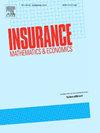Risk exchange under infinite-mean Pareto models
IF 2.2
2区 经济学
Q2 ECONOMICS
引用次数: 0
Abstract
We study the optimal decisions and equilibria of agents who aim to minimize their risks by allocating their positions over extremely heavy-tailed (i.e., infinite-mean) and possibly dependent losses. The loss distributions of our focus are super-Pareto distributions, which include the class of extremely heavy-tailed Pareto distributions. Using a recent result on stochastic dominance, we show that for a portfolio of super-Pareto losses, non-diversification is preferred by decision makers equipped with well-defined and monotone risk measures. The phenomenon that diversification is not beneficial in the presence of super-Pareto losses is further illustrated by an equilibrium analysis in a risk exchange market. First, agents with super-Pareto losses will not share risks in a market equilibrium. Second, transferring losses from agents bearing super-Pareto losses to external parties without any losses may arrive at an equilibrium which benefits every party involved.
无穷均值帕累托模型下的风险交换
我们研究了代理的最优决策和均衡,这些代理的目标是通过在极重尾(即无限均值)和可能的依赖损失上分配头寸来最小化风险。我们关注的损失分布是超帕累托分布,其中包括一类极重尾帕累托分布。利用随机优势的最新结果,我们证明了对于具有超帕累托损失的投资组合,具有明确定义和单调风险度量的决策者更倾向于不分散。通过对风险交换市场的均衡分析,进一步说明了在存在超帕累托损失的情况下分散投资无益的现象。首先,具有超帕累托损失的代理人不会在市场均衡中分担风险。第二,将损失从承受超帕累托损失的代理人转移到没有任何损失的外部各方,可能会达到一种对各方都有利的均衡。
本文章由计算机程序翻译,如有差异,请以英文原文为准。
求助全文
约1分钟内获得全文
求助全文
来源期刊

Insurance Mathematics & Economics
管理科学-数学跨学科应用
CiteScore
3.40
自引率
15.80%
发文量
90
审稿时长
17.3 weeks
期刊介绍:
Insurance: Mathematics and Economics publishes leading research spanning all fields of actuarial science research. It appears six times per year and is the largest journal in actuarial science research around the world.
Insurance: Mathematics and Economics is an international academic journal that aims to strengthen the communication between individuals and groups who develop and apply research results in actuarial science. The journal feels a particular obligation to facilitate closer cooperation between those who conduct research in insurance mathematics and quantitative insurance economics, and practicing actuaries who are interested in the implementation of the results. To this purpose, Insurance: Mathematics and Economics publishes high-quality articles of broad international interest, concerned with either the theory of insurance mathematics and quantitative insurance economics or the inventive application of it, including empirical or experimental results. Articles that combine several of these aspects are particularly considered.
 求助内容:
求助内容: 应助结果提醒方式:
应助结果提醒方式:


